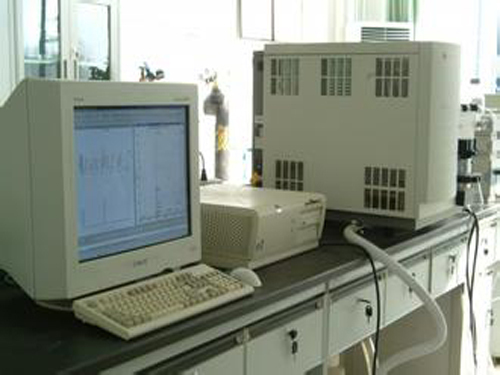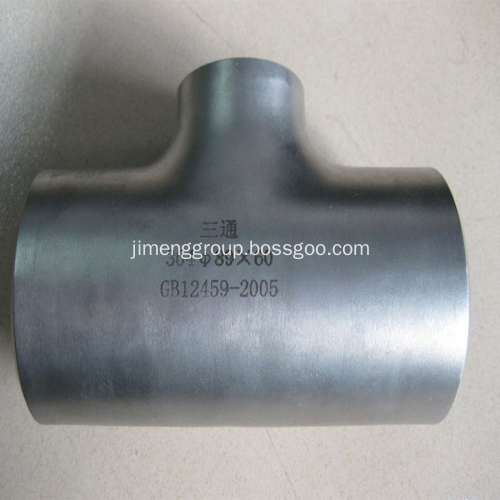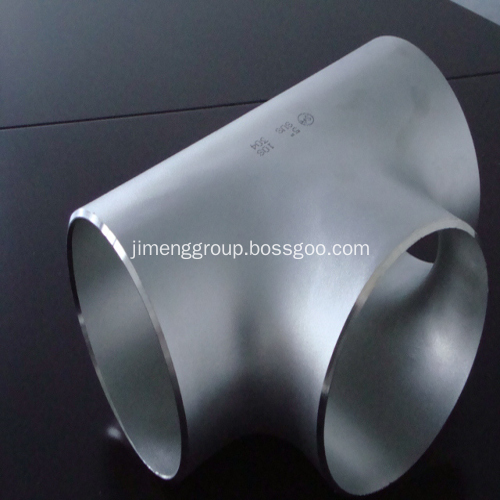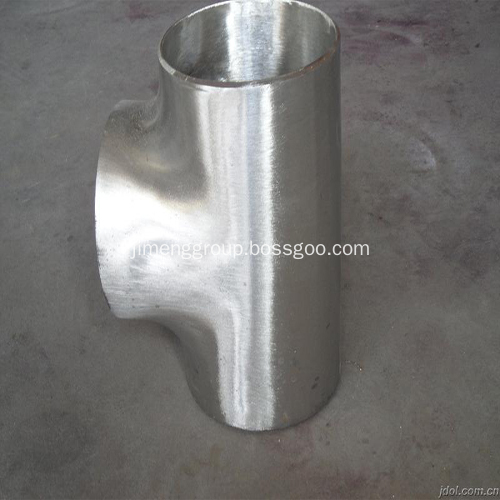Recently, at the sixth meeting of the leading group for comprehensive deepening of reform, the Central Committee reviewed and adopted the "Opinions on the Opening up of Major Scientific Research Infrastructure and Large Scientific Instruments to the Public."
Higher quality and Lower Price Export Standard Tee Produced by Jimeng Group.
GOST Tee,DIN Tee,JIS Tee,KS Tee,ASME Tee,UNI Tee
Size:DN 10-DN 2000
Standard:ANSI,ASME,JIS,KS,GOST,DIN,UNI,EN,GB
Export Country:US.UK.SERBIA,RUSSIA,ITALY,IRAN,KOREA,JAPAN,SPAIN,CHILE,BRAZIL
SCH NO:5,10,20,30.40,60,80,120,140,160,STD,XS
Welding Method:Seam,Seamless,Half Seamless.
Radius Type:1.5D(Long),1.0D(Short)
Surface Finish:Nature Surface,Sand Blasting,Painting,cold galvanizing,hot galvanizing.
GOST Standard Tee, DIN Standard Tee, JIS Standard Tee, KS Standard Tee, ASME Standard Tee, UNI Standard Tee Hebei Jimeng Highstrength Flange-tubes Group Co.,Ltd. , https://www.jimengflange.com
The Ministry of Science and Technology held a press briefing on the afternoon of the 28th to comment on the issue of how to solve the problem of scattered, closed, repetitive, and inefficient technology resources mentioned in the opinion.
With the rapid increase in the number and value of scientific research facilities and instruments, the problem of low utilization and sharing levels has become increasingly prominent. According to the Ministry of Science and Technology, in 2013, the average annual working hours for large scientific instruments in China was 1,157 hours, and the external service rate was 10.6%.
In response, Cai Wenyu, deputy director of the Development Planning Department of the Ministry of Science and Technology, said that the object of guidance for this opinion mainly includes two major categories: one is a major scientific research infrastructure, which has a clear demand in the early stages of construction, and is guided by national strategic needs. The overall application is good; the other part is a large scientific instrument. This part needs to be differentiated from two aspects. On the one hand, the development of the public scientific undertaking needs the support of these large scientific instruments, but on the other hand, there is a problem of blind purchase.
"Most of the science and technology projects are managed on a project-by-project basis. Project budgets that are not implemented on time may be recovered, and purchasing instruments is the quickest way to spend money. In addition, there is also a lack of overall planning in the process of purchasing instruments. So when the project When you need to use some sort of instrument, the first thing you might think of is not to borrow a lease, but to buy one to come back,†he said.
"Before the introduction of the opinions, some existing laws and regulations are not suitable for open sharing. For example, according to the current regulations, imported instruments and equipment used for scientific research and teaching can enjoy preferential policies for tax reduction and exemption, but only for the use of the unit. The scientific research work cannot be used externally for other units, and it must not be used for business purposes. Most high-end equipment and equipment are imported.†Cai Wenxuan said that there is a contradiction between self-use and sharing.
"This issue has attracted attention this time. The "Opinions" are committed to making breakthroughs at the policy level," said Cai Wenxuan. In addition, in the past, due to fragmentation of management, the open service platform standards for various types of scientific research facilities and instruments were not uniform, which was not conducive to the exchange of information between users and management units. In this opinion, it is proposed to formulate unified standards and norms, establish a unified and open national network management service platform, and achieve open information sharing. All management units must establish online service platforms in accordance with uniform standards and standards and incorporate them into the national network management platform. All eligible scientific research facilities and instruments must be integrated into the platform. The establishment of a national network management service platform is the basis for the open sharing of scientific research facilities and instruments.
According to him, the incentive mechanism mentioned in this opinion includes three aspects: First, adopt ***. The management unit provides open and shared services to the outside, and can collect service fees according to the principles of cost compensation and non-profitability. Service revenue is included in the unit budget and is managed by the unit. The scientific research instruments and equipment incorporated into the unified management of the national network platform and enjoying the tax exemption policy for imports of scientific and educational supplies and scientific and technological development supplies shall be allowed to be used for scientific and technological development, scientific research, and teaching activities of other units on the premise of meeting regulatory requirements. The second is to consider and strictly control the purchase of equipment and equipment in the new project.
It is an important condition for the unit to use science and research facilities and instruments to carry out scientific research activities with priority as support from the national science and technology plan. Third, scientific research facilities and instruments with good openness and high user evaluations, and financial departments at the same level have established open and shared subsidy management mechanisms in accordance with the assessment results and financial budget management requirements.
Constraint mechanism is mainly to: open management and use of information not in accordance with the provisions, poor opening effect, the use of low efficiency management units, adopt online notification, stop the management unit to purchase, declare the project is not allowed to purchase equipment and other means to be bound. Those who have strong commonality but have poor open sharing can be allocated free of charge within the department or across departments, and the management unit can also be allocated internally.
Cai Wenxuan said that in the past, fiscal input had no mandatory constraints on the resources that were formed. Incentive policies were mainly based on incentives and lacked a sound fund allocation mechanism. Prior to this, the central government regularly provided operational funding support for state key laboratories, but it has not been explicitly applied to the maintenance and updating of scientific research instruments.
In addition, in scientific research units, researchers are first-line, and experimental personnel are second-line and third-line. No matter whether they are in terms of job title or income, they are inferior to scientific researchers. This opinion has solved this problem by increasing incentive support and guiding the management unit to increase the salary and treatment of experimental personnel. In addition, the focus of the opinions is to make full use of scientific research facilities and instruments scattered in various scientific research units.
The opinions clarified the incentives and penalties. In respect of rewards, it was proposed that subsidies should be given to operating services through financial investment based on the operating rate of scientific research facilities and instruments, the quantity and quality of external services, and some specific measures were also proposed in terms of punishment. . For example, if instruments and equipment are not shared externally or are not well-utilized, the purchase requirements of equipment and equipment proposed by the management unit in the new application for a national science and technology plan project will be greatly affected.
“What we need to do now is to bring suppliers of equipment and equipment that need to use these equipment to carry out experiments, and efficiently combine information management platforms together with good rewards and punishments. A pull to form a joint force." Cai Wenzhao said.
According to reports, this opinion will be implemented in phases. A database of equipment will be established this year. In 2015, the system for reviewing newly purchased equipment will be perfected. The newly purchased equipment will be integrated into the national platform management; the platform will be completed in 2016. Each unit built its own data platform and docked with the national platform to define the service mode, process, and content; in 2017, it evaluated the evaluation of the openness of equipment and equipment of management units and announced it to the public. 


China will set up a database of equipment and equipment this year
